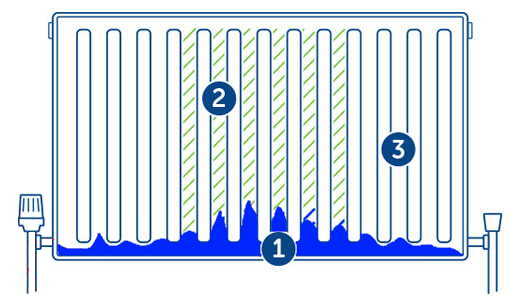Powerflush FAQ
The older your central heating system is, the more likely it is you have sludge in your radiators.
Blocked radiators make your bills higher, as your heating has to work harder to warm your home. Sludge can also damage your boiler, heat pump and valves.
- Radiator sludge is a mix of dirt and rust. This builds up over time and gathers at the bottom of your radiators.
- The sludge stops hot water flowing through your system properly. This creates cold areas on your radiator.
- Other areas of the radiator are unaffected by the sludge and warm up as normal.

If your radiator is not warming up at the top, you probably have air trapped inside. You can let the air out by bleeding the radiator with a radiator key. You can buy this from a DIY store.
You might have sludge or rust blocking your radiator or pipes.
This is tricky to fix. So it's best to ask a Gas Safe registered engineer to take a look. They may need to powerflush your central heating system to remove the blockage. After that, they may add an inhibitor solution to stop future build-up.
If your heating is on and other radiators are working fine, you may have stuck or frozen valves. These stop water getting into the radiator. Or, again, sludge or rust may be to blame.
In some cases, there may be a bigger problem going back to your boiler. We recommend you ask a Gas Safe registered engineer to take a look. You might need to have your central heating system powerflushed.
Noisy radiators aren't usually anything to worry about. A ticking or clicking sound is just the metal of the radiator expanding or contracting as it warms up or cools down.
If the noise is coming from under the floor, it's probably the pipes expanding or contracting.
You might also hear the radiator whistling if the water flow rate is too high. Try turning the radiator valve fully on. This should stop the whistle.
Banging, clanking and gurgling sounds can be caused by air in the radiator. Bleeding your radiators could fix the problem. Some noises might be caused by loose pipes under the floorboards. If you think this is the case, it’s best to get a Gas Safe registered engineer to take a look.
A radiator leak could be caused by several things, including a leaking valve or corrosion.
If you notice a radiator leaking water, you should turn off the valves at each end. Use a bucket or towels to catch leaking water. Then contact a qualified engineer.
It is recommended that you should have your heating system flushed every four to five years. When you have a new boiler installed, depending on the water quality of your system, it may be necessary to carry out a full powerflush at that point.
The time it takes to flush a system depends largely on the size of the property and how blocked or dirty the system is.
The larger the system and the more sludge there is, the longer it will take. We take pride in the quality of our work and will flush your system for as long is required to clean the system and will work on each individual radiator to specifically ensure each one is clear of blockages.
To give an indication, a property with a system consisting of fifteen radiators will take a whole day to complete.
To give an indication, a property with a system consisting of fifteen radiators will take a whole day to complete.